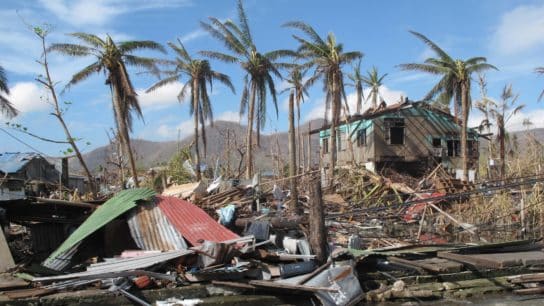Protesters gathered in Seoul’s Gangnam District, which hosts numerous corporate offices and tech companies, as temperatures soared past 30C amid an unusual early autumn heatwave.
—
More than 30,000 people took to the streets in South Korea’s capital Seoul on Saturday demanding more action on climate change, days after a top court ruled that the government’s climate policies violate fundamental human rights.
Protesters from all walks of life marched in Seoul’s Gangnam District under the slogan “Let’s Change the World, Not the Climate,” many holding handmade cardboard banners reading “Climate Justice” and “Change Now.”
Demonstrators interviewed by several media outlets said they were frustrated at their government inaction and worried about their future. In a joint statement seen by The Korea Times, 611 civic and environmental groups said they were marching to “address the climate disaster and global injustice, and to protect a life of equality and dignity.”
“There is no place for people’s livelihoods in efforts to increase electricity demand for economic growth or to expand nuclear risks and greenhouse gases,” the statement read.
South Korea is placed in a unique position in terms of nuclear energy policies due to its drastic transition in recent years. In 2017, the newly elected left-wing president Moon Jae-In announced a gradual phase-out of nuclear power plants over the next 45 years. However, the current president, right-wing Yoon Seok-Yeol, reversed plans to continue building new nuclear power plants and operating the plants that were set to be shut down since his election in 2022.
As of 2022, nuclear accounted for 16% of the country’s energy mix, while all three major fossil fuels combined – coal, natural gas, and oil – made up more than 80% of the total.
Speaking with Reuters, Kim Eun-Jung from the 907 Climate Justice March Committee, the protest’s organizers, said their goal was to “raise our voices” to big polluting corporations driving global warming.
“This year, we are holding the event in Gangnam, specifically because many large corporations, which bear significant responsibility for the climate crisis through carbon emissions, are concentrated here,” she said.
On Saturday, temperatures soared past 30C amid an unusual early autumn heatwave. The country just experienced its highest average summertime temperature since records began half a century ago –nearly 2C higher than the historic average, the Korea Meteorological Administration confirmed last week.
Temperatures in South Korea rose by 0.23C (32.41F) per decade between 1954-1999 and by 0.5C between 2001 and 2010, according to a 2021 report by the International Energy Agency (IEA). Between 2000 and 2020, the country has seen a 0.6C (33.08F) increase in annual temperatures.
More on the topic: How Climate Change Is Unfolding in South Korea
The protest came just little over a week after a group of young climate activists scored a landmark victory at the Constitutional Court of Korea. The court late last month ruled that the government’s measures to fight climate change are insufficient for protecting the rights of its citizens. It was Asia’s first climate litigation ruling of its kind.

Currently, South Korea does not have any legally binding targets to cut greenhouse gas emissions between 2031 and 2049. This absence means the government cannot guarantee the protection of future generations, a right engrained in its constitution, the court ruled.
Featured image: 350.org/Flickr.
This story is funded by readers like you
Our non-profit newsroom provides climate coverage free of charge and advertising. Your one-off or monthly donations play a crucial role in supporting our operations, expanding our reach, and maintaining our editorial independence.
About EO | Mission Statement | Impact & Reach | Write for us














